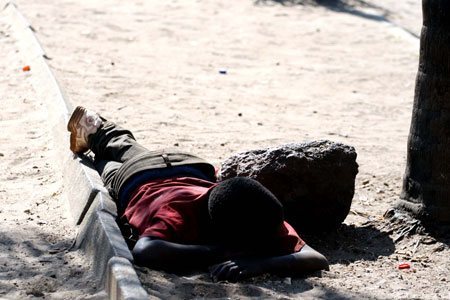
On a sunny morning in Bulawayo, 14-year-old Tapiwa is basking in the sunlight on a busy pavement.
After running away from his abusive stepmother last year, Tapiwa turned to sex work to earn a living on the streets.
He is one of the rising number of homeless children in a nation crippled by a cash crunch that has led to shortages of fuel and price hikes of basic necessities.
Child rights groups said the sexual abuse of underage girls was widely discussed but to date little attention had been given to the boys caught up in the sex trade to survive.
Gay sex is illegal in Zimbabwe, carrying a prison sentences of up to three years, but non-governmental organisations (NGOs) said reports of rising numbers of underage boys selling themselves on the streets were rife.
“There is a brothel on 12th Avenue here in the city where my friends and I solicit for sex in exchange for money,” Tapiwa told the Thomson Reuters Foundation, adding his clients usually paid $10 for 30 minutes.
Zimbabwean parliamentarian Siphiwe Ncube, a senator for Bulawayo Metropolitan province, said the authorities were aware of this trend, with abandoned beer halls converted into unofficial venues for sex work.
“Of course, we know what is happening in the city … we don’t support this as leaders and parents because it makes children lead a bad life,” she told the Thomson Reuters Foundation.
- Chamisa under fire over US$120K donation
- Mavhunga puts DeMbare into Chibuku quarterfinals
- Pension funds bet on Cabora Bassa oilfields
- Councils defy govt fire tender directive
Keep Reading
Bulawayo City Council spokesman Nesisa Mpofu confirmed the authority had leased unused beer halls to the community for businesses and had no say on how tenants ran those places.
“We are not aware of the 12th Avenue brothel, but that should be reported to the Zimbabwe Republic Police,” she said, adding that this would now be investigated.
Sikholiwe Ncube, programmes officer at the Bulawayo-based Thuthuka Street Children’s Home, said the nation’s economic crisis had forced more children onto the streets, leaving them vulnerable.
Thomson Reuters Foundation











